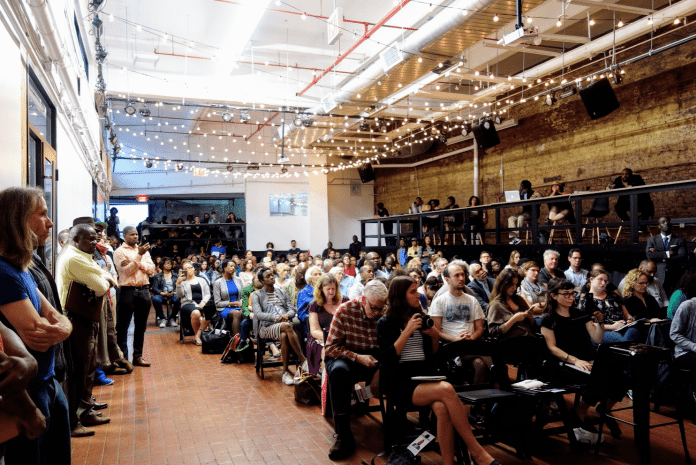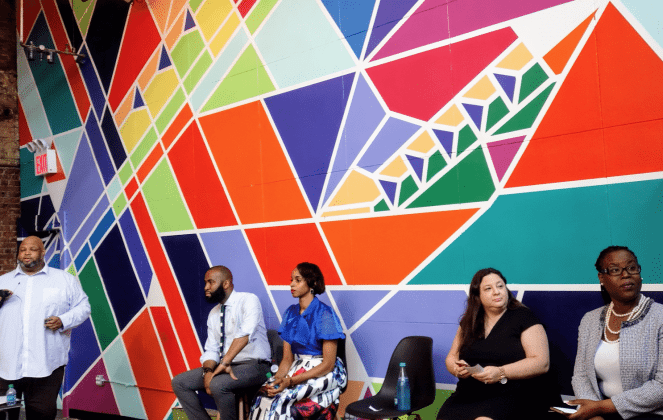Ditmas Park’s City Council Candidates Debate Major Issues


On June 5, City Council Candidates for District 40 (Ditmas Park, Flatbush, Prospect-Lefferts Gardens) held a debate on the most pressing issues facing our district.
In case you missed it, check out this comprehensive review of the issues that matter most, before heading over to the third debate tonight (with candidates from District 45 and the Brooklyn district attorney race).
Interest in political engagement is at a high in Brooklyn, and with a total of five candidates in play, the event was packed. (Thanks to neighbors who organized the event Seth Kaplan, Calista De Jesus with support from Cheryl Sealey, Brenda Edwards, Emily Leshner, and BKLYN Commons.)
Only one chair was empty for the first part of the debate, the one reserved for incumbent Councilmember Mathieu Eugene, who arrived late (had was with a police officer who was in a coma, he said later). When he did arrive, he referred to the other candidates as his “opponents” throughout the evening.

The organizers reached out to local political rockstar Duane Joseph and asked him to play moderator. Duane Joseph is a long-time resident of Flatbush via the Caribbean and describes himself as a concerned resident looking to bridge the information gap.
You can watch the entire, 2-hour debate here, or read our edited synopsis below:
While waiting for Eugene to arrive, each candidate introduced themselves and their goals.
Brian Cunningham, who announced his candidacy last May, focused on his experience in government. “I am running because I have seen a lot of changes in the last ten years,” he said. “I love this community, I was born and raised in this community and after this race is over, my commitment to public service will not be over.”
Pia Raymond, who we interview in February, emphasized her work with economic engines along Nostrand Avenue and on the board of CB9. “My story is part of your story,” she said. “I know what it means for a business to be displaced.” Raymond reiterated what would become some of the ongoing themes of the night: changes, rent costs, and young people in need to engage. But she also focused on crime. “…in the midst of all the things happening here, we are still dealing the persistent crime problem.”
Jen Berkely focused on an issue she has worked on for the last decade. “I am here because our community is in a housing crisis. It not being addressed. How do I know it’s not being addressed?” she asked out loud. “Because I looked to see the how many affordable units we had when the City Councilmember took office. We have 15,000 less affordable units than we did when he took office.”
Rose St Albord explained she is a “masterpiece and a work in progress…running because it is time for us to re-invent ourselves.” Her objectives focused on our “need to makes homes affordable, schools accountable, our streets safer for all residents.”
Then, the questions began.
“Given the importance of transportation as it provides access to getting an education and to economic opportunity. How would you improve it?”
Brian Cunningham: Many simply cannot afford the cost of the subway, he said. Cunningham was the only candidate to suggest a solution, citing the 1700 people who use the Church Avenue train station between 6 and 9am every weekday morning: He believes we should mimic what the both the subway in the West Coast and the Metro North here do, make off-peak hours cheaper.
Pia Raymond: cited her experience increasing transportation options along the Nostrand business strip, like the select bus service, and a metro card to encourage shopping along the Nostrand strip. Raymond also cited her role in helping to create bike lanes and bike parking options to encourage business and travel options. “Obesity is the number one health issue in Brooklyn,” she said, with a commitment to simplify walking and biking options.
Jen Berkely: highlighted repeated fare increases when the service has been getting “worse and worse and worse.” She felt strongly that we need to send the message that we won’t continue to foot the bill as service gets worse. She will do whatever she can to make sure the service gets better.
Rose St Albord: suggested a discount for families and for older straphangers. She also agreed that select buses were a great idea, but that select busses have angered some residents who see multiple select buses pass by while regular service seems to be suffering. This comment appeared to have hit a nerve and triggered a round of applause.
“How Do You See Yourself Being An Advocate For Safer Streets?”
Pia Raymond: said encouraging walking is a path toward safer streets, especially for seniors. She discussed her work in getting Citibike to come to her area and wants more benches and bus shelters to encourage more outdoor activity.
Jen Berkley: said the current bike lanes are a great idea but painted lanes on the street force you to “take your life into your hands.” It’s a delicate balance to increase foot traffic and other forms of transportation, she said, and intends to conduct a survey on it.
Rose St Albord: believes “it takes a village” — we have to increase accountability for both bikers and walkers. “We cannot look only at our side. People are reckless when they ride, people are reckless when they walk while texting.”
Brian Cunningham: complemented the Mayor on the success of Vision Zero and cited the need for protected bike lanes. There are parts of the city where there is a row of parked cars or other dividers insulating the bike lanes.
“Explain Your Plan for Tackling the Housing Crisis”
Jen Berkely: given the high numbers of property violations against landlords, she would create a registry of the worst violators and aggressively fine them. She cited her work as a “fighter” for victims of landlords looking to push people out of their homes.
Rose St Albord: cited landlords who refuse to make repairs to inspire non-payment for which they can evict. Albord would make all landlords fill out a form of what kind of maintenance they would be expected to keep up and force them to either make repairs or forfeit the rent. She would also provide more pro bono legal help in fighting for tenants rights.
Pia Raymond: cited continued work with Impact Brooklyn and Brooklyn Legal Services, and the Flatbush Tenant Coalition. She will use her platform at City Council to educate the public and support these groups.
Brian Cunningham: feels strongly about land and tax abatements. We need to use the possibility of canceling them as a tool, he said. If you take city dollars you have responsibilities to uphold.
Councilmember Eugene: “Housing is one of the biggest crises in the nation,” he said, citing funding he gave to non-profits and testimony he gave before the DOB against raising rents.
What Are Your Plans To Push For a Fair Property Tax Program (because many taxes are going up to cover the new values because of buildings that are getting abatements)?
Rose St Albord: “Property taxes are already high”. Her goal will be to work to find ways to make new developments pay for the new costs to cover older residents raises in costs.
Brian Cunnigham: said that the 421A tax abatement needs to be killed outright because any tax abatement is a zero sum effect. He would like to downzone, to disincentivize 421A. Cunningham also cited specifics numbers regarding the percentage of “affordable” housing being delivered for tax breaks.
Pia Raymond: Shared the commitment to downzoning. She cited her history on CB9 for support for downzoning.
Councilmember Eugene: said he “voted to downzone Victorian Flatbush”. He also said we need to lower the tax cost for retirees. “It is very complicated, there is no one answer.”
Jen Berkeley: “Downzoning is only one answer to the problem.” She says the Community Boards play a big role in downzoning and believes that City Council can play a bigger role in negotiating with developers.
What is your position on Charter Schools and the effect they have on public schools?
Councilmember Eugene: “We have to invest in [public] education”. But if there are other schools, “we should support them.”
Brian Cunningham: “It is the city’s responsibility to take care of the public schools first.” He cited an example of how a school got a 501C3 attached to their school to allow them to pursue outside funding. He also cited the difference between Capital funding and other monies, saying we need to generate funding for both.
Pia Raymond: served as a program director in a public school and feels it’s critical to support public schools, college preparation, and fighting the digital divide. She would also support existing charter programs but not focus on new ones for the future.
Jen Berkely: Our city is one of the wealthiest in the world and the schools and should “not have to hold bake sales to pay the bills.” She also called out our low graduation rate in nyc as a particular issue she would address.
Rose St. Albord: said many kids “aren’t learning but rather are taught to memorize”
She feels that many school problems need to be dealt with by instituting “accountability” for our school leadership and not just throwing money at problems.
Councilmember Eugene: Explained that he gives money to every school, supporting chess programs and other special events.
Joseph then switched gears and called on audience questions, like: How would you intervene in gang violence? (Create more community centers and vocational training, said Albord; raising rates of summer jobs, said Eugene; expand interest-based social development programs, said Raymond; make “every school a beacon” instead of creating new spaces, said Cunningham.)
What can you do to help the small businesses keep up with the rising cost of rent?
(specialized commercial rent control, said Berkeley; encourage the SBA to take over a percentage of the store rent, said St. Albord; more programs like ‘shop local’ supported by city council, and a separate stream to help preschools, said Raymond; explore landmarking small businesses integral to the cultural landscape, said Cunningham. “Everyone who comes to Brooklyn wants to go to Juniors Cheesecake. We have places that could have that kind of draw.”)
The last question was a personal one for Joseph and the immediate community. “Since we are in the area covered by CB9 can you tell us what you would do to make it more functional.” This question got applause and clearly was important to this room.
Pia Raymond, the only candidate on CB9, said, “Unfortunately we have had a lot of discord and changes in leadership” which has held up voting on things like liquor licenses. But she said “we have new leadership” and expressed confidence that things would go smoother this year.
Cunningham called for a more formal application process and training for Community Board leadership. He also felt strongly that there should be term limits on Community Board service. This last point received applause from the audience.
Learn more about each candidate, with videos, here.



